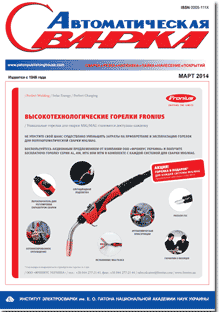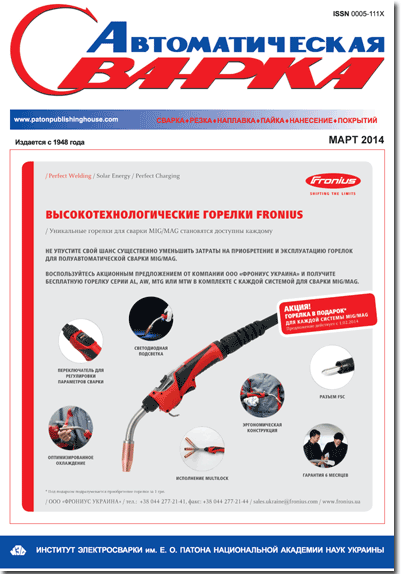| 2014 №03 (09) | 2014 №03 (02) |

Журнал «Автоматическая сварка», № 3, 2014, с.3-12
ЧИСЛЕННОЕ МОДЕЛИРОВАНИЕ И ПРОГНОЗИРОВАНИЕ МИКРОСТРУКТУРЫ МЕТАЛЛА СВАРНЫХ ШВОВ ПРИ СВАРКЕ ВЫСОКОПРОЧНЫХ СТАЛЕЙ (Обзор)
Д. Ю. ЕРМОЛЕНКО, В. В. ГОЛОВКО
ИЭС им. Е. О. Патона НАНУ. 03680, г. Киев-150, ул. Боженко, 11. E-mail: office@paton.kiev.ua
Реферат
Проведен анализ современного состояния проблем численного моделирования и прогнозирования микроструктуры металла сварных швов ВПНЛ сталей. Проанализированы современные подходы к компьютерному моделированию микроструктуры сварного шва с точки зрения прогнозирования микроструктуры и свойств металла швов с учетом влияния на них неметаллических включений. Рассмотрены общие положения проблемы моделирования процесса образования и развития неметаллических включений в металле сварного шва. Рассмотрен термодинамический подход к прогнозированию микроструктуры металла шва и его недостатки. Выполнен анализ особенностей моделирования процесса кристаллизации металла в сварочной ванне. Отмечены теоретические модели роста дендрита по Иванцову, KGT-теории; описаны ограничения аналитического моделирования. Проведен критический анализ численных моделей дендритной кристаллизации. Сделан вывод, что наиболее адекватных и экспериментально обоснованных результатов моделирования роста дендритов с учетом влияния неметаллических включений стоит ожидать от метода клеточных автоматов, который необходимо модифицировать с учетом возможностей аналитических и численных моделей. Такой подход сопряжен с вычислительной простотой и отсутствием необходимости определения ряда физических констант для реальных материалов. Библиогр. 53, рис. 3.
Ключевые слова: сварной шов, микроструктура, первичная структура, дендриты, неметаллические включения, численное моделирование, прогнозирование микроструктуры
Поступила в редакцию 22.11.2013
Опубликовано 20.02.1014
1. David S. A., Babu S. S., Vitek J. M. Recent advances in modeling and characterization of weld microstructure // Sci. and Techn. of Weld. and Joining. – 2001. – 6, № 6. – P. 341– 346.
2. Trends in welding research: proceedings of the 5th Intern. conf.: M. L. Santella, S. S. Babu, B. Riemir, Z. Feng: Materials Park, OH, ASM Intenational, 1999. – P. 605–609.
3. Grong O. Metallurgical modeling of welding. — The Institute of Materials, London, 1997. – 605 p.
4. Mathematical models of transport phenomena associated with arc-welding processes: a survey / P. G. Jonsson, J. Szekely, R. T. T. Choo, T. P. Quinn // Modeling and Simulation in Material Sci. and Eng. – 1994. – № 2. – P. 995–1016.
5. Evans G. M., Bailey N. Metallurgy of Basic Weld Metal. – Cambridge: Abington, 1997. – 432 p.
6. Kluken A. O., Grong O. Mechanisms of inclusion formation in Al–Ti–Si–Mn deoxidised steel weld metals // Metallurgical Transactions A. – 1989. – 20A. – P. 1335–1349.
7. Calculation of inclusion formation in low alloy steel welds / K. C. Hseih, S. S. Babu, J.M. Vitek, S. A. David // Mat. Sci. Eng. – 1996. – A215. – P. 84–91.
8. Koseki T., Ohkita S., Yurioka N. Thermodynamic study of inclusion formation in low alloy steel weld metals // Sci. and Techn. of Weld. and Joining. – 1997. – № 2. – P. 65–69.
9. Development of macro- and microstructures of C–Mn low alloy steel welds –inclusion formation / S. S. Babu, S. A. David, J. M. Vitek et al. // Mat. Sci. and Techn. – 1995. – № 11. – P. 186–199.
10. Effect of high-energy-density welding processes on inclusion and microstructure formation in steel welds / S. S. Babu, F. Reidebach, S. A. David et al. // Sci. and Techn. of Weld. And Joining. – 1999. – № 4. – P. 63–73.
11. Manson P. Program aids in modeling welding thermodynamics // Welding J. – 2012. – № 12. – P. 28–30.
12. Thermo-calc and DICTRA, computational tools for materials science / J. O. Andersson, T. Helander, L. Hoglund et al. // Calphad. – 2002. – № 26. – P. 273–312.
13. Babu S. S. Thermodynamic and kinetic models for describing microstructure evolution during joining of metals and alloys // Intern. Mat. Review. – 2009. – № 54(6). – P.333–367.
14. New model for prediction of ferrite number of stainless steel welds / S. S. Babu, J. M.Vitek, Y. S. Iskander, S. A. David // Sci. and Techn. of Weld. and Joining. – 1997. – № 2(6). – P. 279–285.
15. Vitek J. M., Iskander Y. S., Oblow E. M. Improved ferrite number prediction in stainless steel arc welds using artificial neural networks. – Pt. 1: Neural network development // Welding J. – 2000. – № 79(2). – P. 33–46.
16. Bhadeshia H. K. D. H., Svensson L. E., Gretoft B. A model for the development of microstructure in low-alloy steel (Fe–Mn–Si–C) weld deposits // Acta Met. – 1985. – № 33. – P. 1271–1283.
17. Ion J. C., Easterling K. E., Ashby M. F. A second report on diagrams of microstructure and hardness for heat-affected zones in welds // Ibid. – 1984. – № 32(11). – P. 1949–1962.
18. Kasuya T., Yurioka N. Carbon Equivalent and Multiplying Factor for Hardenability of Steel // Welding J. – 1993. – № 72. – P. 263–268.
19. Smallman R. E., Bishop R. J. Modern physical metallurgy and materials engineering. – Oxford: Auckland Boston Johannesburg Melburn New Delhi, 1999. – 438 p.
20. Pavlyk V. Modeling and direct numerical simulation of dendritic structures under solidification conditions during fusion welding. – Aachen: Shaker Verlag GmbH, 2004. – 147 p.
21. David S. A., Babu S. S., Vitek J. M. Welding: solidification and microstructure // JOM. – June 2003. – Режим доступа: http://www.tms.org/pubs/journals/JOM/0306/David-0306. html.
22. Trivedi R., Kurz W. Dendritic growth // Intern. Mat. Rewiews. – 1994. – № 39(2). – P. 47–74.
23. Kurz W., Giovanola B., Trivedi R. Theory of microstructure development during rapid solidification // Acta Met. – 1986. – № 34(5). – P. 823–830.
24. McCartney D. G., Hunt J. D. A numerical finite difference model of steady state cellular and dendritic growth // Metallurgical Transactions A. – 1984. – 15A. – P. 983–994.
25. Brown S. G. R., Williams T., Spittle J. A. A cellular automaton model of the steady-state «free» growth of a non-isothermal dendrite // Acta Met. et Mat. – 1994. – № 42(8). – P. 2893–2898.
26. Sasikumar R., Sreenivasan R. 2-dimensional simulation of dendrite morphology // Ibid. – 1994. – № 2(7). – P. 2381–2386.
27. Tiaden J., Grafe U. A phase-field model for diffusion and curvature controlled phase transformations in steels // Proc. of the Intern. Conf. on Solid-Solid Phase Transformations’99, Kyoto, Japan. – 1999. – P. 737–740.
28. Koseki T. Solidification and solidification structure control of weld metals // Welding Intern. – 2001. – № 16(5). – P. 347–365.
29. The redistribution of solute atoms during the solidification of metals / W. A. Tiller, K. A. Jackson, J. W. Rutter, B. Chalmers // Acta Met. – 1953. – № 1. – P. 428–437.
30. Mulins W. W., Sekerka R. F. Stability of a planar interface during solidification of a dilute binary alloy // J. of Appl. Phys. –1964. – № 35(2). – P. 444–451.
31. Иванцов Г. П. Температурное поле вокруг сферического, цилиндрического и иглообразного кристалла растущего в переохлажденном расплаве // Докл. АН СССР. – 1947. – № 58(4). – C. 567–569.
32. Темкин Д. Е. О скорости роста кристаллической иглы в переохлажденном расплаве // Там же. – 1960. – № 132(6). – С. 1307–1310.
33. Trivedi R. Growth of dendritic needles from a supercooled melt // Acta Met. – 1970. – № 18(3). P. 287–296.
34. Huang H. C., Glicksman M. E. Fundamentals of dendritic solidification: Steady-state tip growth // Ibid. – 1981. – № 29. – P. 701–715.
35. Langer J. S., Muller-Krumbhaar J. Stability effects in dendritic crystal growth // J. of Crystal Growth. – 1977. – № 42. – P. 11–14.
36. Trivedi R., Kurz W. Dendritic growth // Intern. Mat. Rewiews. – 1994. – № 39(2). – P. 47–74.
37. Gandin Ch. A., Rappaz M. A coupled finite element-cellular automaton model for the prediction of dendritic grain structures in solidification processes // Acta Met. – 1994. – № 42(7). – P. 2233–2246.
38. Ploshikhin V. V., Bergmann H. W. Correlation between the welding parameters and the grain structure for the fast moving high power line heat source in a thin plate. – London: The Institute of Materials, 2001. – Mathematical Modelling of Weld Phenomena 5. – P. 269–281.
39. Hunt J. D., McCartney D. G. Numerical finite difference model for steady state cellular array growth // Acta Met. – 1987. – № 35. – P. 89–99.
40. Lu S. L., Hunt J. D. A numerical analysis of dendritic and cellular array growth: the spacing adjustment mechanisms // J. of Crystal Growth. – 1992. – № 123. – P. 17–34.
41. Hunt J. D., Lu S. Z.. Numerical modelling of cellular/dendritic array growth: Spacing and structure predictions//Met. and Mat. Transactions A. – 1996. – № 27A(3). – P. 611–623.
42. Spittle J. A., Brown S. G. R. A 3d cellular automaton model of coupled growth in two component systems // Acta Met. Et Mat. – 1994. – № 42(6). – P. 1811–1815.
43. Dilthey U., Reichel T., Pavlik V. A modified cellular automaton model for grain growth simulation. – London: The Institute of Materials, 1997. –Mathematical Modelling of Weld Phenomena 3. – P. 106–113.
44. Kurien L., Sasikumar R. Simulation of dendrite morphology in the presence of particles // Acta Mat. – 1996. – № 44(8). – P. 3385–3395.
45. Sasikumar R., Jacob E., George B. Simulation of dendrite growth in binary alloys// Scr. Mat. – 1998. – № 38(4). – P. 693–701.
46. Галенко П. К., Кривилев М. Д. Изотермический рост кристаллов в переохлажденных бинарных сплавах // Мат. моделирование. – 2000. – 12, № 11. – С. 17–37.
47. Галенко П. К., Кривилев М. Д. Конечно-разностная схема для моделирования кристаллического структурообразования в переохлажденных бинарных сплавах // Там же. – 2000. – 12, № 12. – С. 11–23.|
48. Кривилев М. Д., Галенко П. К. Моделирование переходак бездиффузионному затвердеванию при высокоскоростной кристаллизации бинарных сплавов // Вестн. Удмуртского ун-та. – 2008. – № 1. – С. 129–140.
49. Кривилев М. Д., Галенко П. К. Программный комплекс для моделирования кристаллического структурообразования в переохлажденных бинарных сплавах: Уч. пос.– Ижевск: Удмуртский ун-т, 1999. – 59 с.
50. Zhang Y. Phase field modeling of dendritic growth and coarsening supercooling. – InTech: ISBN: 978-953-51-0113-0. – 2012. –134p. – Режим доступа: http://www.intechopen.com/books/supercooling/phase-field-modeling-of-dendritegrowth.
51. Лебедев В. Г., Данилов Д. А., Галенко П. К. Об уравнениях модели фазового поля для неизотермической кинетики превращений в многокомпонентной и многофазной системе // Вестн.Удмуртского ун-та. – 2010. – № 1. – С.26–33.
52. Phase field concept for multiphase systems / I. Steinbach, F. Pezzolla, B. Nestler et al. // Physica. D. – 1996. – № 94(3). – P.135–147.
53. Kobayashi R. A numerical approach to three-dimensional dendritic solidification // Exp. Mat. – 1994. – № 3. — P. 410–423.
The cost of subscription/purchase order journals or individual articles
| Journal/Currency | Annual Set | 1 issue printed |
1 issue |
one article |
| TPWJ/USD | 384 $ | 32 $ | 26 $ | 13 $ |
| TPWJ/EUR | 348 € | 29 € | 24 € | 12 € |
| TPWJ/UAH | 7200 UAH | 600 UAH | 600 UAH | 280 UAH |
| AS/UAH | 1800 UAH | 300 UAH | 300 UAH | 150 UAH |
| AS/USD | 192 $ | 32 $ | 26 $ | 13 $ |
| AS/EUR | 180 € | 30 € | 25 € | 12 € |
| SEM/UAH | 1200 UAH | 300 UAH | 300 UAH | 150 UAH |
| SEM/USD | 128 $ | 32 $ | 26 $ | 13 $ |
| SEM/EUR | 120 € | 30 € | 25 € | 12 € |
| TDNK/UAH | 1200 UAH | 300 UAH | 300 UAH | 150 UAH |
| TDNK/USD | 128 $ | 32 $ | 26 $ | 13 $ |
| TDNK/EUR | 120 € | 30 € | 25 € | 15 € |
AS = «Automatic Welding» - 6 issues per year;
TPWJ = «PATON WELDING JOURNAL» - 12 issues per year;
SEM = «Electrometallurgy Today» - 4 issues per year;
TDNK = «Technical Diagnostics and Non-Destructive Testing» - 4 issues per year.





